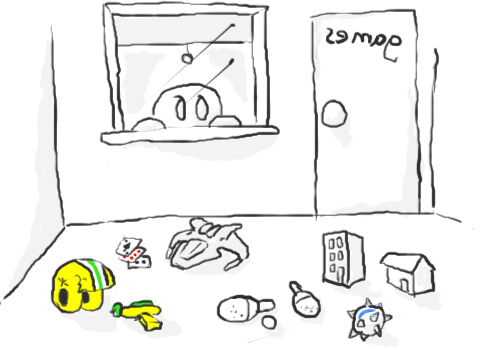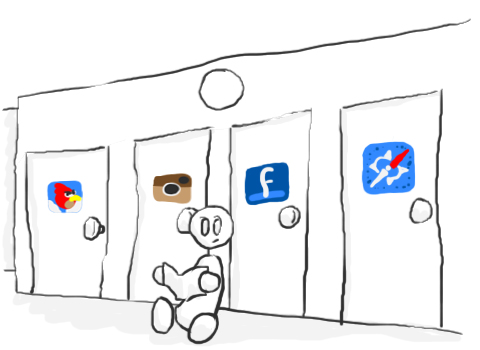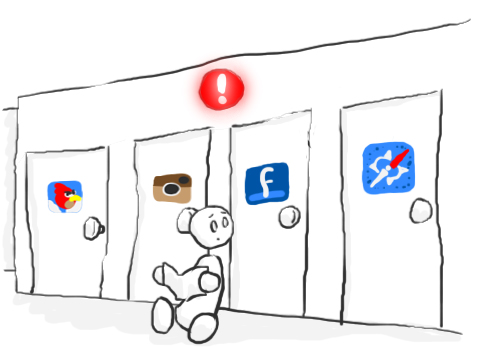Since the latest episodes of both Bent and Throw it Against the Wall have seen me mention Windows Phone 7, I think it’s about time I talk about why I like it. I know there’s a lot of scepticism surrounding it. And why not? Most people I know who were considering jumping the Microsoft ship did so in the dark days of Vista, so that’s their last experience with Windows. Anyone who saw their parents working on a Treo back in the nascent days of the Blackberry know the sloppy, malfunctioning horror that was Windows Mobile 6.5.
There’s a messy pedigree there. And with technology becoming increasingly homogenous in terms of features and capability, people are right to ask why they should want to go back.
It took me a while to figure out why I love Windows Phone as much as I do, and why I’m so excited about Windows 8. And it goes back to Windows itself, and the philosophy behind its naming in the early days of home computing.
Imagine yourself in the beige box days of computers.


I was fortunate enough to be in a house that had a computer from the first days (well, my first days)—my folks had one for work and upgraded frequently (from 386 to 486 to an early Pentium, each one becoming more in line with current tech). And at school, we had tons of classic Apple Macintosh computers. So far from being bred into an ecosystem, I got in on the ground floor with both systems. As the home computers got better, we slowly evolved at school into Power Macs, then candy-coloured iMacs and beyond.
While I remember vividly the Number Munchers and desktop publishing on Macs through the years, something about having “Windows†at home spoke to me.
Imagine the pre-internet home computer model (especially from a child’s perspective). You’ve got the computer box, where all the stuff goes.

Then, you’ve got the monitor, which lets you look at all the stuff you’ve got in the box.

The file structure of the computer always seemed a little like different rooms to me. You go in the front door of the big house that is your computer when you turn it on. You go into the foyer, to your desktop, and from there to different rooms.

The Windows name made sense to me. I’m not really in the computer, of course, but I can look into each different room through a special window.

Now, it doesn’t do you much good to have a window going from one room into another. But you were only ever inside your computer in the pre-internet days. When the internet came about, you got the opportunity to get out of the house and run down the street and poke around in other houses, and there was, for Windows users, an icon that became your front door.
Smartphones, at least since the iPhone, are characterized by always-on data connections and being constantly connected to different apps, services, and people. But even when the iPhone launched, we were still working with variants of the rooms analogy, only now, instead of windows, we got doors.

And sure, plenty of these doors had awesome stuff delivered to you when you went through the door.

Sometimes, there’s even a knock at the door to let you know when something’s arriving.



I was really excited by the prospect of Android, following the debut of the iPhone. Not only would you be able to go through all of the same kinds of doors, but you could cover the walls in widgets! And it was all open-sourced and to be built on by the community. But when I got my hands on a couple of Android devices, the spartan hallway I saw with the iPhone started to look like this:


Enter Windows Phone. The always-on data connection of the other big contenders, plus a slightly different philosophy on how you interact with your information.
Windows has always been, in my mind, about seeing into your technology. The desktop OS has been about looking into your computer, occasionally stepping out into the wider world. But there’s always been a door between the two.

Now, with Windows Phone, the curtains roll up. Each live tile is a window, not just into the phone, but into the big wide world.



It’s a better way to do it. It really is the evolution of the Windows brand, and fundamentally it gets back to what Windows was all about in the first place. Letting you look into your technology, or out into the wider world.
And the whole ecosystem is going this way. Windows Phone, Xbox, and Windows 8 – all are going to Metro UI, all adopting live tiles and connectivity in a way that makes it easier to immediately gain access to information and interact with technology.
So why do I like Windows Phone? Because it gets back to the original Windows philosophy, the idea that charmed me back in the beige box days. I want to see something open when I look at my technology—not just a bunch of closed doors.

Source:http://spillwaybrain.wordpress.com/2011/11/10/why-windows/


